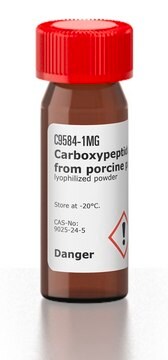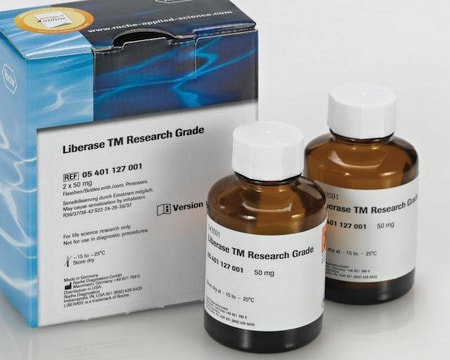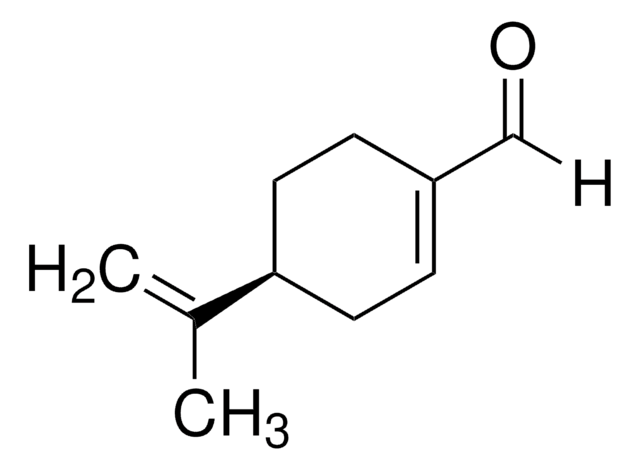SCC205
LUVA Human Mast Cell Line

Sinonimo/i:
Laboratory of University of VirginiA Cell Line
Autenticatiper visualizzare i prezzi riservati alla tua organizzazione & contrattuali
About This Item
Codice UNSPSC:
41106514
Prodotti consigliati
Origine biologica
human
Livello qualitativo
Confezionamento
vial of ≥1X10⁶ cells/vial vial
Produttore/marchio commerciale
Millipore
tecniche
cell culture | mammalian: suitable
Condizioni di spedizione
liquid nitrogen
Temperatura di conservazione
−196°C
Applicazioni
- Each vial contains >1X106 viable cells.
- Cells are tested negative for infectious diseases by a Mouse Essential CLEAR Panel by Charles River Animal Diagnostic Services.
- Cells are verified to be of human origin and negative for interspecies contamination from human, rat, Chinese hamster, Golden Syrian hamster, and nonhuman primate (NHP) as assessed by a Contamination Clear panel by Charles River Animal Diagnostic Services
- Cells are negative for mycoplasma contamination.
Caratteristiche e vantaggi
The LUVA cell line is a human mast cell in vitro cell model used to study the mechanisms which cause mastocytosis, inflamation and allergic responses.
Descrizione del bersaglio
Mast cells are a type of granulocyte that are important components for the immune system and the process of inflammation. When activated, they will release compounds inducing an inflammatory response and anaphylaxis. They are also directly involved in causing allergies and related disorders. Previously, mast cell lines such as LAD2 were used as in vitro cell models for studying mast cells. However, they were unstable and inconsistent for culturing.1A new mast cell line was developed and given the name of LUVA cells, which mirror the morphology and functionality of human mast cells.
The CD34+ mast cells were cultured for 8 weeks with stem cell factor and cultured with IL-6 and IL-3 for only one week. The stable LUVA cells were maintained and became capable of growing without further addition of growth factors in culture, making them highly convenient for culturing. They are the first mast cell line in which the donor patient did not have a mast cell disorder, as well as having no mutation in the c-kit receptor.1
The LUVA cell line allows for a proper in vitro mast cell model in which researchers can study the mechanisms which cause mastocytosis, a condition where mast cells aggregate in certain parts of the body.2 This condition results in a higher risk of life-threatening allergic reactions as well as rarely resulting in mast cell cancers. Commonly, mastocytosis is caused by a mutation of the c-KIT protein, a receptor tyrosine kinase. By understanding c-KIT mechanisms, therapies can continue to develop and improve for mastocytosis patients.
Source: The LUVA mast cell line was derived from CD34+ cells of a non-mastocytosis donor with aspirin-exacerbated respiratory disease.
References
1. Laidlaw, T.M., et al. Characterization of a novel human mast cell line that responds to stem cell factor and expresses functional FcεRI. Journal of Allergy and Clinical Immunology 127:815-822.e5 (2011)
The CD34+ mast cells were cultured for 8 weeks with stem cell factor and cultured with IL-6 and IL-3 for only one week. The stable LUVA cells were maintained and became capable of growing without further addition of growth factors in culture, making them highly convenient for culturing. They are the first mast cell line in which the donor patient did not have a mast cell disorder, as well as having no mutation in the c-kit receptor.1
The LUVA cell line allows for a proper in vitro mast cell model in which researchers can study the mechanisms which cause mastocytosis, a condition where mast cells aggregate in certain parts of the body.2 This condition results in a higher risk of life-threatening allergic reactions as well as rarely resulting in mast cell cancers. Commonly, mastocytosis is caused by a mutation of the c-KIT protein, a receptor tyrosine kinase. By understanding c-KIT mechanisms, therapies can continue to develop and improve for mastocytosis patients.
Source: The LUVA mast cell line was derived from CD34+ cells of a non-mastocytosis donor with aspirin-exacerbated respiratory disease.
References
1. Laidlaw, T.M., et al. Characterization of a novel human mast cell line that responds to stem cell factor and expresses functional FcεRI. Journal of Allergy and Clinical Immunology 127:815-822.e5 (2011)
Stoccaggio e stabilità
LUVA human mast cells should be stored in liquid nitrogen. The cells can be cultured for at least 10 passages without significantly affecting cell marker expression and function.
Altre note
This product is intended for sale and sold solely to academic institutions for internal academic research use per the terms of the “Academic Use Agreement” as detailed in the product documentation. For information regarding any other use, please contact licensing@emdmillipore.com.
Esclusione di responsabilità
Unless otherwise stated in our catalog or other company documentation accompanying the product(s), our products are intended for research use only and are not to be used for any other purpose, which includes but is not limited to, unauthorized commercial uses, in vitro diagnostic uses, ex vivo or in vivo therapeutic uses or any type of consumption or application to humans or animals.
Certificati d'analisi (COA)
Cerca il Certificati d'analisi (COA) digitando il numero di lotto/batch corrispondente. I numeri di lotto o di batch sono stampati sull'etichetta dei prodotti dopo la parola ‘Lotto’ o ‘Batch’.
Possiedi già questo prodotto?
I documenti relativi ai prodotti acquistati recentemente sono disponibili nell’Archivio dei documenti.
Il team dei nostri ricercatori vanta grande esperienza in tutte le aree della ricerca quali Life Science, scienza dei materiali, sintesi chimica, cromatografia, discipline analitiche, ecc..
Contatta l'Assistenza Tecnica.






